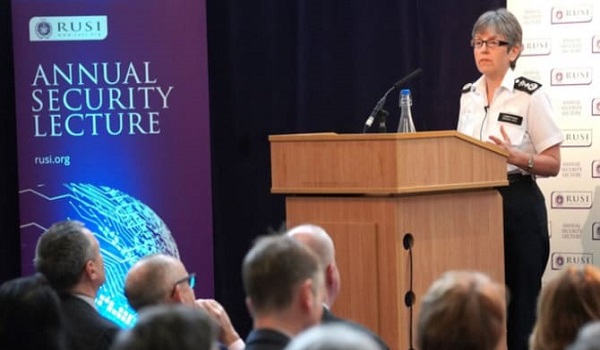MPS commissioner calls for legal framework on police use of AI
The Commissioner of the Metropolitan Police Service has called on the Government to create a legal framework to allow the police to use new technologies such as artificial intelligence (AI) and live facial recognition (LFR) to better fight crime.
Delivering a keynote speech at the Royal United Services Institute (RUSI) today (February 24), Dame Cressida Dick told delegates that critics of the use of such technology would need to justify to victims of crime why police should not be allowed to use these methods.
Potential innovations included “speech analytics software to help identify high-harm, high-risk or threat calls to the police”, translation technology to cope with the many different languages spoken in London, and “virtual and augmented reality” to improve officers’ decision-making and community engagement.
Dame Cressida said: “I and others have been making the case for the proportionate use of tech in policing, but right now the loudest voices in the debate seem to be the critics – sometimes highly inaccurate or highly ill-informed.
“It is for critics to justify to the victims of those crimes why police should not use tech lawfully and proportionally to catch criminals who caused the victims real harm. It is not for me and the police to decide where the boundary lies between security and privacy, although I do think it is right for us to contribute to the debate.
“Given that criminals normally make powerful use of the digital world, why should police not have access to cutting-edge tech too if we can use it as a force for good?
“But speaking as a member of public, I will be frank. In an age of Twitter, Instagram and Facebook, concern about my image and that of my fellow law-abiding citizens passing through LFR and not being stored, feels much, much, much smaller than my and the public’s vital expectation to be kept safe from a knife through the chest.”
The commissioner said updated legislation would be needed so that politicians and the public could debate the appropriate boundaries for police use of technology in future.
“If, as seems likely, algorithms can assist in identifying patterns of behaviour by those under authorised surveillance, that would otherwise have been missed – patterns that indicate they are radicalising others or are likely to mount a terrorist attack; if an algorithm can help identify in our criminal systems material a potential serial rapist or killer that we could not have found by human endeavour alone; if a machine can improve our ability to disclose fairly, then I think almost all citizens would want us to use it,” said Dame Cressida.
“The only people who benefit from us not using lawfully and proportionately tech are the criminals, the rapists, the terrorists and all those who want to harm you, your family and friends.”
Dame Cressida said that she welcomed the Government’s 2019 manifesto pledge to create a legal framework for the police use of new technology like AI, biometrics and DNA.
“This is about using a tool that can augment intelligence rather than replace it,” she said. “The Met’s trials of LFR resulted in the arrest of eight wanted individuals whom we would otherwise have been very unlikely to identify. Without LFR, those eight individuals who were wanted for having caused harm would probably not have been arrested.
“The best way to ensure that the police use new and emerging tech in a way that has the country’s support is for the Government to bring in an enabling legislative framework that is debated through Parliament, consulted on in public and which will outline the boundaries for how the police should or should not use tech. Give us the law and we’ll work within it.”
Dame Cressida rejected concerns that facial recognition algorithms are racially discriminatory in that their accuracy rates vary depending on skin colour.
“We know there are some cheap algorithms that do have ethnic bias, but, ours doesn’t, and currently the only bias is that it shows it is slightly harder to identify a wanted woman than a wanted man,” she said.
The commissioner said two choices lay ahead. One was to shun technology so police did “not use the tech that increases the likelihood of solving and preventing crime”, leaving the public “rightly indignant”. The other, which she favoured, was to “use tech proportionately to speed up how we – human officers – solve and prevent crime”.





